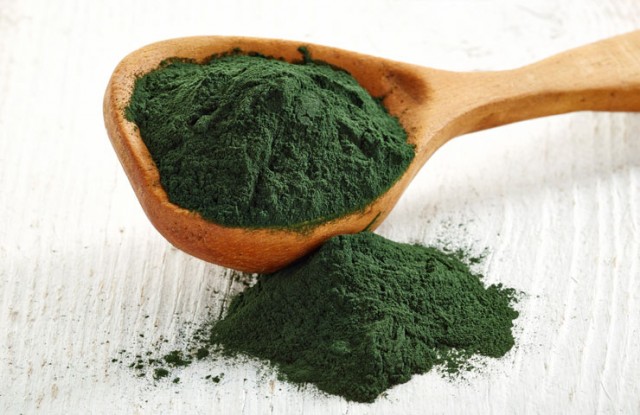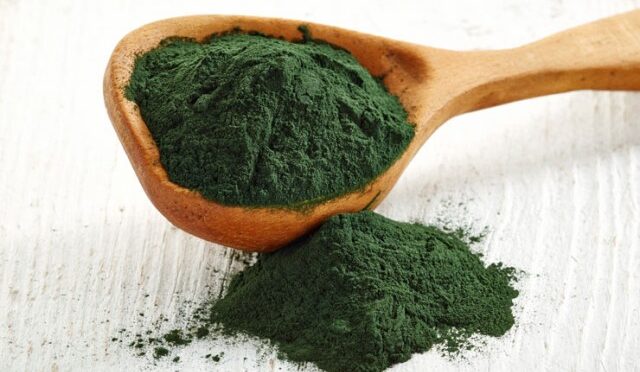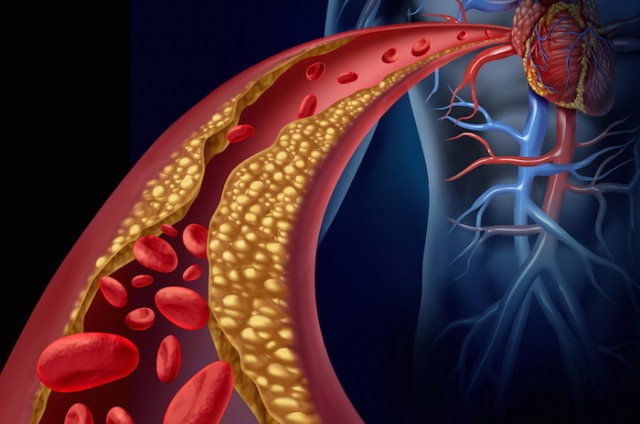Spirulina is packed with a variety of nutrients, especially proteins which take up 60-70%. Therefore, it represents an excellent source of protein for vegetarians. Quantitatively, taking one teaspoon of spirulina, you are entering 1.2 grams of protein into your body.
Spirulina has a lot of iron, about 28 grams per 100 grams of powder.
To enter 50% of the recommended daily intake of iron, women younger than 50 years should take 5 teaspoons of spirulina per day, while women over 50 years three teaspoons a day.

It is best to use spirulina along with some other supplements to increase the iron levels in your body. A recent study showed that the intake of 3 grams of spirulina per day increases the level of hemoglobin and red blood cells in individuals suffering from anemia.
In addition to protein and iron, Spirulina is also an excellent selection of vitamin B12. However, you can not rely only on spirulina for your daily vitamin intake, but here are some things this superfood helps with.
1. Reduces chronic fatigue
Thanks to its high content of polysaccharides, vitamin B and essential fatty acids, spirulina fills your body with energy.
2. Fights against allergies
Do you suffer from seasonal allergies? Taking 2 grams of spirulina per day for a period of six months eliminates the symptoms of allergic rhinitis, including sneezing, nasal congestion and itching.
3. It has strong antiviral properties
Animal studies have shown that spirulina may help to inhibit the replication of several types of viruses, including herpes, measles, mumps and the flu, and even the HIV virus.
4. Lowers cholesterol
Spirulina can be of great benefit for people suffering from heart disease. Several studies have investigated whether this supplement reduces the fat content in the blood and they discovered that a daily dose of 2-4 grams for a period of 3 months decreases the content of cholesterol and triglycerides in the blood
5. Lowers blood pressure
It is alleged that a dose of 4.5 grams per day for a period of six weeks reduced blood pressure in people with normal blood pressure.
6. Helps with diabetes
Several animal studies have shown that spirulina significantly reduced blood sugar levels, overriding even the popular diabetes drug metformin.
This supplement contains manganese and the amino acid cysteine, which both have an important role in creating insulin.
One human study discovered that 2 grams of spirulina per day for a period of 2 months lowers blood sugar.
7. It works against cancer
Phycocyanin, the main active component of spirulina which gives it the blue-green color, has powerful antioxidant properties. It is alleged that the antioxidant capacity of this component is somewhere in the level of vitamins C and E.
Animal studies have shown that spirulina reduces the chances of cancer.
8. Chronic arsenic poisoning
If you plan on traveling to countries where drinking water contains a lot of arsenic (eg Bangladesh, India, Taiwan and Chile), it may be advisable to take 250 mg of spirulina with 2 mg of zinc twice daily for 16 weeks, because that way you will be reducing the level of arsenic in the body.
9. It has a prebiotic effect
Spirulina and its prebiotic effect stimulates the good bacteria of the intestinal flora, maintaining the proper functioning of the digestive system.
Warnings and Contraindications
Also, since Spirulina strengthens the immune system, its consumption can worsen the symptoms of a disease that that makes the immune system hyperactive, such as for example multiple sclerosis, lupus and rheumatoid arthritis. Spirulina can also have contraindications when taken with other drugs, so you should always consult your doctor if you are already taking any medication.
People with a hereditary metabolic disorder, phenylketonuria, must not take spirulina because it contains phenylalanine, an amino acid that these people can not metabolize.
If you want to start drinking spirulina, start with small doses and gradually increase them.
The powder variant can be mixed with juices or shakes, while the spirulina capsules should be taken with water.
References:
http://www.livescience.com/48853-spirulina-supplement-facts.html


